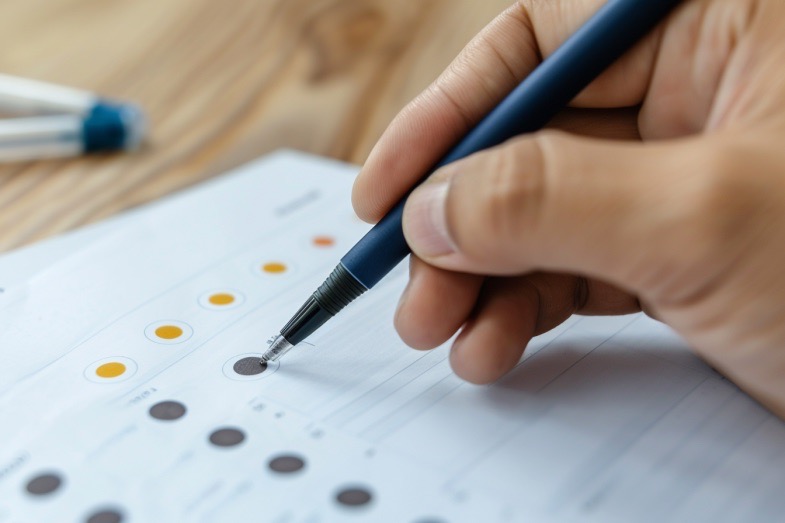Global Stock Markets Plummet After Trump’s Tariff Announcement
NEW YORK — In the aftermath of President Donald Trump’s announcement of sweeping new tariffs, global stocks have taken a nosedive, sparking fears of rising prices and economic slowdown in the US and beyond.
Stock markets across the Asia-Pacific region plunged for a second consecutive day, following the lead of the US S&P 500, which experienced its worst day since the onset of the Covid pandemic in 2020.
Nike, Apple, and Target were among the major consumer brands hit the hardest, with all of them witnessing drops of over 9%.
At the White House, Trump expressed optimism, claiming that the US economy would experience a “boom” as a result of the minimum 10% tariff he intends to impose on global imports, aiming to boost federal revenues and encourage domestic manufacturing.
The president plans to levy even higher tariffs on products from numerous countries, including key trading partners like China and the European Union.
China, currently facing a 54% aggregate tariff, and the EU, facing duties of 20%, have both declared plans for retaliatory measures.
French President Emmanuel Macron has urged European companies to halt planned investments in the US in response to the tariffs.
Trump’s tariff plan, unveiled on Wednesday, proposes some of the highest duty levels in over a century, drawing concerns from the World Trade Organization, which anticipates a 1% decline in global trade volumes.
Traders are apprehensive that these tariffs could fuel inflation and hinder economic growth.
In Friday’s morning trading, Japan’s Nikkei 225 index plummeted by 2.7%, while Australia’s ASX 200 dropped by 1.6%. South Korea’s Kospi remained relatively stable.
Markets in mainland China and Hong Kong were closed for the Qingming Festival.
The S&P 500, which tracks the performance of 500 major US companies, tumbled by 4.8% on Thursday, wiping out approximately $2 trillion in market value.
The Dow Jones fell by about 4%, while the Nasdaq experienced a sharp 6% decline. The ongoing US stock sell-off, triggered by fears of a trade war, has been ongoing since mid-February.
Earlier, the UK’s FTSE 100 index dropped by 1.5%, mirroring declines seen in other European markets and across Asia.
During a White House briefing on Thursday, Trump remained steadfast in his aggressive trade policy, aiming to reverse decades of global trade liberalization led by the US.
“I think it’s going very well,” he stated. “It was an operation akin to a major surgery, and it’s a significant move. I predicted this outcome.”
Contrary to claims by White House aides that the tariffs were not a negotiation tactic, Trump hinted at the possibility of a deal with trade partners if presented with an exceptional offer.
Canadian Prime Minister Mark Carney announced plans for a 25% tariff on vehicles imported from the US in retaliation.
Firms now face the dilemma of absorbing the tariff costs, collaborating with partners to share the burden, or passing it on to consumers, risking a decline in sales.
This decision holds considerable weight as US consumer spending accounts for 10-15% of the global economy, according to some estimates.
While stocks suffered on Thursday, the price of gold, a safe-haven asset during times of uncertainty, reached a historic high of $3,167.57 per ounce before receding.
The dollar also weakened against several currencies.
European analysts at Principal Asset Management predict that tariffs could reduce growth by nearly 1% in the EU, with further impact if retaliatory measures are taken.
Without additional changes, such as significant tax cuts promised by Trump, a recession in the US seems imminent, cautioned Seema Shah, chief global strategist at the firm.
She emphasized that Trump’s ambition to boost manufacturing would be a prolonged process, if achieved at all.
On Thursday, Stellantis, the maker of Jeep and Fiat, announced temporary production halts at factories in Mexico and Canada in response to a 25% car import tax imposed by Trump, resulting in 900 temporary layoffs at five US plants supplying these factories.
On the stock market, Nike, known for manufacturing in Asia, faced a significant drop of 14%, while Apple, heavily reliant on China and Taiwan, saw a 9% decline.
Retailers like Target witnessed a drop of around 10%, and Harley-Davidson, previously targeted by EU tariffs during Trump’s first term, experienced a 10% decline.
In Europe, shares of Adidas and Puma fell by over 10% and 9%, respectively, while luxury goods companies like Pandora and LVMH dropped by double digits following the imposition of tariffs.
“Retailers are bearing the brunt of unexpected tariff extensions to new countries,” remarked Jay Woods, chief global strategy at Freedom Capital Markets, forecasting further market volatility ahead. — BBC



